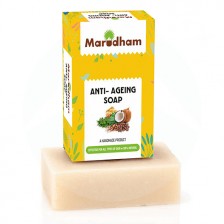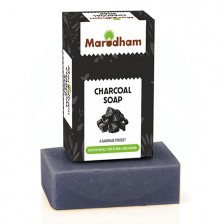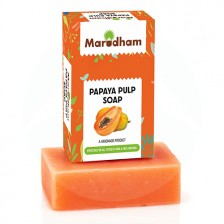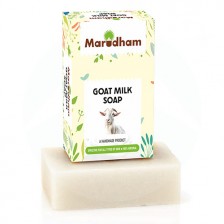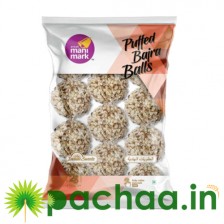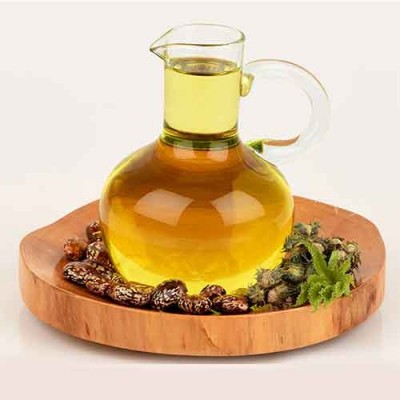Featured Products
Coconut Oil Soap 100g
Coconut Oil Soap 100gAbout the productMade with organically grown coconuts and pure castor oil for y..
₹150.00
Anti Ageing Soap 100g
Anti Ageing Soap 100gAbout the productAnti Ageing Soap is Six Oil’s Combination Soap. The wood-press..
₹150.00
Charcoal Scrub Soap 100g
Charcoal Scrub Soap 100gAbout the productCharcoal scrub soap is made in historical methods that were..
₹150.00
Papaya Pulp Soap 100g
Papaya Pulp Soap 100gAbout the productPapaya Pulp Soap is a fusion of science and nature. It is a na..
₹150.00
Skin Brightening Soap 100g
Skin Brightening Soap 100gAbout the productTransform your skin from ordinary to extraordinary with ..
₹150.00
Skin Repair Soap 100g
Skin Repair Pungam Oil Soap 100gAbout the productSay goodbye to blemishes and hello to a clear, radi..
₹150.00
Goat Milk Soap 100g
Goat Milk Soap 100gAbout the productMade with pure goat’s milk sourced from our farms most natural..
₹150.00
Black Sesame Candy Balls (கருப்பு எள்ளு உருண்டை) 70g
Black Sesame Candy Balls (கருப்பு எள்ளு உருண்டை) 70gIntroducing our irresistible Black Sesame Candy ..
₹45.00
Black Sesame Candy Bar (கருப்பு எள்ளு மிட்டாய்) Rs.10
Black Sesame Candy Bar (கருப்பு எள்ளு மிட்டாய்) Rs.10Introducing our irresistible Black Sesame Candy..
₹10.00
Nice Peanut Candy Bar (வேர்க்கடலை நைஸ் பார்) 100g
Nice Peanut Candy Bar (வேர்க்கடலை நைஸ் பார்) 100gIntroducing our Nice Peanut Candy Bar, a delectable..
₹40.00
Puffed Bajra / Kambu Balls (கம்பு பொரி உருண்டை)
Puffed Bajra / Kambu Balls - பார்லி பொரி உருண்டை 12pcs..
₹35.00 ₹40.00
Puffed Barley Balls (பார்லி பொரி உருண்டை)
Puffed Barley Balls - பார்லி பொரி உருண்டை 12pcs..
₹35.00 ₹40.00
Kamarkat | Kamarkattu | Coconut Jaggery Candy (கமர்கட்) 100g
Kamarkat | Kamarkattu | Coconut Jaggery Candy - கமர்கட் 100g..
₹35.00 ₹40.00
Wooden Serving and Cooking POLISHED BROWN NEEM WOOD Spoons Set | Wood Spoons/Spatula for Cooking - Kitchen Tools - (Set of 6)
Wooden Serving and Cooking POLISHED LIGHT BROWN NEEM WOOD Spoons Set | Wood Spoons/Spatu..
₹240.00 ₹599.00
Wooden Serving and Cooking POLISHED SHEESAM WOOD Spoons Set | Wood Spoons/Spatula for Cooking - Kitchen Tools - (Set of 6)
Wooden Serving and Cooking POLISHED SHEESAM WOOD Spoons Set | Wood Spoons/Spatula for Co..
₹260.00 ₹699.00
Castor Oil Amanakku Vilakku Ennai (ஆமணக்கு எண்ணெய்) 100ml
Folk healers worldwide have used castor oil to treat a wide variety of health conditions for thousands of years. The use of castor oil goes as far back as the ancient Egyptians, who used it to treat eye irritations and as a powerful natural skin care remedy. In India, castor oil has been prized for its skin-healing, digestive-soothing, antibacterial properties and is commonly used in traditional Ayurvedic medicine practices.
For centuries, at the first sign of illness, many mothers and grandparents would immediately turn to giving their children castor oil either topically or internally to naturally boost immune function and speed up healing. Derived from the seeds of the castor bean plant (Ricinus communis), records show that many years ago the plant was referred to as the “Palma Christe” because the shape of the plant’s leaves were said to resemble the palm of Christ.
What Is Castor Oil?
Throughout history, castor oil’s most popular use has been for treating skin infections, lowering constipation and boosting the appearance of hair health, but research has shown that castor oil has even more important applications for supporting the immune system. Castor oil is capable of increasing white blood cells and the count of T-11 cells (a type of special white blood cells that act like antibodies) produced within the body’s lymphocytes that help kill viruses, fungi, bacteria and cancer cells.
Many of castor oil’s benefits come down to its chemical composition. It’s classified as a type of triglyceride fatty acid, and almost 90 percent of its fatty acid content is a specific and rare compound called ricinoleic acid. Castor oil is considered to be pretty unique because ricinoleic acid is not found in many other substances, and it’s such a dense, concentrated source. It is produced by cold-pressing the seeds and subsequent clarification of the oil by heat.
Aside from its primary constituent, ricinoleic acid, castor oil also contains certain beneficial salts and esters that function primarily as skin-conditioning agents. At the same time, they help stabilize the texture and consistency of products, which is why castor oil is used in so many cosmetics, hair and skin-care treatments.
According to the International Journal of Toxicology, castor oil and hydrogenated castor oil reportedly were used in 769 and 202 cosmetic products, respectively, during the time of an analysis in 2002! Ricinus communis (castor) seed oil is the name given to the type of castor oil used in cosmetics, which you might find listed on the ingredient label, especially in lipsticks.
Castor Oil Benefits
As an unsaturated fatty acid, ricinoleic acid found in castor oil has many healing abilities, including:
supporting the lymphatic system
increasing circulation
preventing the growth of viruses, bacteria, yeasts and molds
fighting skin disorders and infections
helping to kill ringworm, keratoses, skin inflammation, abrasions and fungal infections
healing acne
helping hair grow
reducing itching and swelling on the skin
fighting toenail fungus
easing constipation
hydrating chapped lips
reducing painful sunburns
helping with pregnancy and inducing labor
and many more
One of the major reasons castor oil has strong immune-enhancing effects is because it supports the body’s lymphatic system. The most significant role of the lymphatic system, which is spread throughout the whole body in small tubular structures, is that it absorbs and removes excess fluids, proteins and waste materials from our cells.
Lymph nodes located within these tubes act like the body’s natural filters for toxins, and they also pump out antibodies when we’re sick to keep foreign proteins or bacteria at bay. If you’ve ever had an enlarged lymph node in your neck or near your genitals, for example, this is a sign that a high level of antibodies are being released in order to fight an infection near that area.
When the lymphatic system isn’t working properly, this can eventually lead to the failure of many healthy cells and possibly degeneration and destruction of organs. For example, poor lymphatic drainage of the heart is linked to tissue damage, which can add to or worsen coronary heart disease conditions.
Aside from capturing leaking fluid from our tissues that contain waste, increasing function of the circulation system and helping create defensive antibodies for the immune system, the lymphatic system also helps absorb lingering fat molecules within the small intestine. In fact, a large percentage of all the fat absorbed from the gut requires the help of the lymphatic system. Some fat molecules remain unabsorbed because they’re essentially too large to move from the small to large intestine. This means they can be released into the lymphatic system and then into the bloodstream, where they can be carried throughout the body to be used for fuel.
10 Castor Oil Uses
1. Improves Immune Function
Castor oil is believed to improve lymphatic drainage, blood flow, thymus gland health and other immune system functions. Research has shown that patients who use abdominal castor oil packs have significant increases in the production of lymphocytes compared with patients using placebo packs. Lymphocytes are the immune system’s natural “disease-fighters” that attack outside invaders such as toxins, bacteria and other perceived threats.
Castor oil helps with the production of proper levels of lymphocytes, which are released and stored within the lymphatic tissue from the thymus gland, spleen, lymph nodes and tissue that lines the small intestine. The lymphatic system also impacts the circulatory and digestive systems, which is why castor oil has benefits for helping you detox, supporting heart health and healing digestive issues like constipation, too.
Castor oil is hydrolyzed in the small intestine by pancreatic enzymes, leading to the release of glycerol and ricinoleic acid, along with other beneficial metabolites.
2. Boosts Circulation
Proper blood flow and immunity go hand in hand. When the lymphatic system fails (or edema develops, which is the retention of fluid and toxins), it’s much more likely someone will become chronically ill.
The circulatory system is responsible for pumping blood to and from the heart, where it moves oxygen throughout the body through small arteries and tiny vessels called capillaries. Within microscopic tubular structures held in the lungs, blood exchanges oxygen and nutrients for cellular waste. This process is crucial for keeping us alive, bringing oxygen to our cells and detoxing our bodies.
3. Fights Skin Infections and Wounds
As you probably already know, beauty is more than skin deep; the health of your skin is often a reflection of the health of your gut, immune system and hormonal balance. The real price of beauty is steep, and loading your skin with chemical ingredients found in store-bought skin care products usually only makes irritation worse. Castor oil is completely natural and synthetic-free, yet it can be directly absorbed through the skin, resulting in several positive outcomes for skin’s appearance.
First and foremost, circulation and blood flow increase, which helps the body better fight infections and heal wounds. Castor oil also works like a natural antibacterial, antifungal and antimicrobrial agent that targets underlying causes of skin disorders. Lymph flow also improves with castor oil use, which can help speed up the removal of cellular-related toxins and therefore lowers levels of swelling, redness and inflammation at the root of most diseases.
4. Helps Balance Hormones and Improve Libido
Enhancing the absorption of fat molecules within the digestive tract is essential for the formation of healthy hormones. That’s what makes castor oil consumption a way to balance hormones naturally. Also with less floating toxins present within and around cells, coupled with better blood flow, sex organ function works more efficiently and people experience less PMS symptoms, fatigue, mood swings and depression.
5. Induces Labor
Castor oil is a time-honored natural remedy for inducing labor. For centuries, pregnant women at full term have been given castor oil orally to help speed up uterus contractions. The reason castor oil works for inducing labor is because ricinoleic acid in the oil activates EP3 prostanoid receptors in the uterus. One downside of using castor oil to help with delivery, and the reason it’s not commonly used in hospitals, is that some woman feel nauseous due to its effects.
What is castor oil? - Dr. Axe
6. Heals Dry, Irritated, Sun-Burnt or Acne-Prone Skin
As a natural antibacterial agent, castor oil works similarly to coconut oil for healing skin. It also makes a great skin moisturizer, anti-inflammatory blemish treatment, and can delay the signs of aging like wrinkles since it helps increase collagen and elastin production.
If you want to heal acne forever, you need to get to the source of the problem. The ricinoleic acid found in castor oil makes it a great natural home remedy for fighting mild acne. As it penetrates deep into the skin, it fights bacteria overgrowth that can clog pores, while softening and hydrating irritated skin at the same time. It also works to solve deeper issues causing breakouts, like hormonal imbalances and an unhealthy balance of bacteria within the gut.
Here are several ways to improve skin health using castor oil:
For a natural acne treatment that’s beneficial long term, dap castor oil onto the affected area with a clean cotton swab. You can also try to use apple cider vinegar and essential oils like frankincense mixed with a small amount of pure coconut oil. All of these options reduce redness and swelling of acne blemishes along with scarring and pain.
To prevent future breakouts, wash your face first in warm water to open up the pores and then massage some of the oil into your face and leave it on overnight, rinsing the next morning.
To hydrate skin without clogging pores: mix 1/4 cup of castor oil and 3/4 cup virgin coconut oil (or 3/4 cup sesame oil), then apply to your body and face.
To moisturize skin that’s normal or oily, try using 1/4 cup of castor oil with jojoba oil, grape seed oil or olive oil instead of coconut and sesame. Gently massage dry areas of your skin with the mixture, then dap off any excess using a clean towel. Allow the treatment to soak in overnight and then rinse well in the morning with warm water.
Another option is creating a fast-acting face mask using one teaspoon of castor oil along with one egg yolk. Apply the mixture to your face for 10–15 minutes, then clean your face.
To soothe a sunburn, castors oil’s anti-inflammatory properties reduce pain and redness. Apply castor oil mixed with coconut oil (in proportion 1:1) to the affected area, or try the same remedy as a natural lip balm to solve chapped or sun-burnt lips.
Something else to consider is that castor oil and ricinoleic acid can enhance the transdermal penetration of other chemicals, so it’s a good idea to only use castor oil along with other natural ingredients that you don’t mind fully absorbing into your skin.
7. Reduces Toenail or Fingernail Fungus, Moles and Cysts
Castor works well as a toenail fungus treatment. For the same reason it helps fight acne, castor oil can get rid of persistent fungal infections, moles and cysts. Traditionally, the method used was to apply a small amount of castor oil with a pinch of baking soda to the infected area.
When ingested, castor oil also works internally to balance gut bacteria and reduce lingering toxins, yeast or molds that can cause fungus to develop in the first place.
8. Relieves Constipation
Castor oil works like a natural mild laxative when taken orally and helps with straining during defecation and feeling of complete evacuation after a bowel movement. Its active ingredient ricinoleic acid gets released in the intestine, where it helps with the process of digestion, nutrient absorption and cleansing the system — helping you poop regularly.
With better circulation and lymphatic drainage, the small intestine become more efficient at fat absorption and removing bad bacteria or toxins, which makes castor oil perfect for natural constipation relief. The gut environment can become more balanced in terms of having more “good bacteria” and less “bad” that interfere with proper bowel movements.
A healthier gut can lower constipation, cramping, bloating (edema), leaky gut syndrome and possibly other symptoms of IBS.
9. Lowers Symptoms of Arthritis
Castor oil is often used a natural treatment for arthritis pain, joint swelling and inflammation. It has natural anti-inflammatory properties that make it an ideal massage oil that can be applied to aching joints, muscles or tissue.
Try massaging painful areas with castor oil followed by a hot water pack to increase absorption and drainage. Practicing this process twice weekly can give you the most pain-reducing results.
10. Helps Strong, Shiny Hair Grow Faster
Just like coconut oil benefits your hair, using castor oil can help your hair grow faster, thicker, stronger, shinier and free of dandruff. Besides the fact that castor oil has omega-6 fatty acids to make hair shine, it goes to the root of the problem and improves circulation. Massage slightly warmed-up castor oil into your hair and scalp, and it will improve the blood circulation to your follicles, which speeds up hair growth. You can try making a homemade hair mask by massaging the oil into your roots and spreading it all over your hair, tying up your hair and covering it with a cap, then leaving the oil on overnight before washing it out.
Keep in mind that castor oil also has antifungal and antibacterial properties that can help clear up dandruff and scalp infections. Mix one tablespoon of castor oil with one tablespoon of olive oil and add juice of half a lemon, apply the mask on the roots of your hair for about 30 minutes, and then rinse out with shampoo.
What’s the Best Kind of Castor Oil to Use?
Castor oil can be used in several ways: topical application on the skin, oil packs or massage. As with essential oil uses or other skin treatments, any oil you ingest or consume (and even the kinds you apply directly to your skin) should really be of the highest quality to ensure safety and effectiveness.
Look for a reputable brand of cold-pressed, pure castor oil at your local health food store or online if you can’t find any in stores. Some people believe that the most effective use of castor oil is castor oil packs or poultices. These might be able to help increase topical absorption through the skin’s pores.
How much castor oil to take:
Dosage of castor oil taken internally depends on what you’re using it for, along with your age, existing medical conditions and response to laxative-type treatments. Read the package directions carefully when purchasing a castor oil pack. Be careful not to increase your dose above the recommended amount, start slowly and don’t take it for more than seven days consecutively unless you’re told to do so by your doctor.
Normally, the dosage set for adults is one teaspoon once a day on an empty stomach. This amount is useful for regulating bowel movements and improving blood flow, and lesser doses might help to maintain general health. However, before taking it regularly and for extended periods of time, check with your doctor about any interactions. For children, the common dosage is half of one teaspoon once per day.
Castor oil is usually sold as a laxative formula and is available in both liquid and capsule forms. Liquid castor oil is known for having a foul taste, yellow color and smell, so most people prefer to dilute it in juice before taking it by mouth.
Are There Any Concerns with Using Castor Oil?
Castor oil is classified by the Food and Drug Administration as generally recognized as safe for both topical and internal use, and is recognized as effective for use as a stimulant laxative. The Joint Food and Agriculture Organization/World Health Organization Expert Committee on Food Additives established an acceptable daily castor oil intake for adults of up to 0.7 milligrams/kilograms body weight. Its active ingredients are considered acute (short-lasting) and nontoxic. Some studies have even found that castor oil at concentrations up to 10 percent of total calorie intake in the diet of rats was not toxic.
That being said, taking too much is definitely a risk and can cause digestive issues like diarrhea or cramping, along other problems. Some people experience nausea and signs of mild irritation in their gut lining when taking castor oil, although this isn’t common and is usually the case with pregnant woman. Pregnant women in general shouldn’t take castor oil without speaking with their doctors first since it can induce labor.
When it comes to using it topically on your skin, the risks are very low considering it’s free from common allergens, synthetic chemicals, drying ingredients or other irritants. Castor oil doesn’t commonly result in allergies, skin sensitivities or act like a photosensitizer, according to human clinical tests. However, it’s still best to start slowly and perform a skin patch test on a small area of your skin before applying larger amounts, and also keep it away from your eyes and inside your nose, babies and pets.
Castor Oil Amanakku Vilakku Ennai (ஆமணக்கு எண்ணெய்) 200ml
- Product Code: PT000316
- Availability: In Stock
-
₹65.00
- Price in reward points: 65
Related Products
Jasmine Uthupatti Agarbatti (12 Boxes)
Jasmine Uthupatti Agarbatti (12 Boxes with Rs.15 MRP)It contains 12 Box of the same image show..
₹180.00
Champa |செண்பக பூ Agarbatti Uthupatti (12 Boxes)
Champa | Shenbaga Poo |செண்பக பூ Herbal Uthupatti Agarbatti (12 Boxes with Rs.15 MRP) It contains 12..
₹180.00
Karunjeeragam Black Cumin Seeds Kala Jeera Oil 50ml
Karunjeeragam Black Cumin Seeds Kala Jeera Oil 50mlKarunjeeragam ,Kala Jeera,Black Cumin Seeds..
₹160.00
Gingelly Oil Nallennai Cold Pressed 1Ltr (செக்கு நல்ல எண்ணை)
Gingelly Oil Nallennai Cold Pressed 1Ltr (செக்கு நல்ல எண்ணை). Organically grown, naturally grind ..
₹440.00
Groundnut Oil Kadalai Ennai Cold Pressed 500ml (கடலை எண்ணை)
Groundnut Oil Kadalai Ennai Cold Pressed 500ml (கடலை எண்ணை). Organically grown, naturally grind..
₹150.00
Coconut Oil Cold Pressed 5 Ltr Can (தேங்காய் எண்ணை)
Coconut Oil Cold Pressed 5 Ltr Can(மர செக்கு தேங்காய் எண்ணை). Organically grown, naturally grind usi..
₹2,500.00
Mysore Sandal Uthupatti Agarbatti (12 Boxes)
Mysore Sandal Uthupatti Agarbatti (12 Boxes with Rs.15 MRP)It contains 12 Box of the same imag..
₹135.00 ₹180.00
Mari Kolunthu Herbal Uthupatti Agarbatti (12 Boxes)
Mari Kolunthu Herbal Uthupatti Agarbatti (12 Boxes with Rs.20 MRP)It contains 12 Box of the same ima..
₹240.00
Flax Seed Oil 100ml
FLAX SEED OILA Rich Source of Healthy FatsRich Source of Omega 3Dietary SupplementMaintain Healthy H..
₹160.00 ₹200.00
Parijatham Uthupatti Agarbatti (12 Boxes)
Parijatham Uthupatti Agarbatti (12 Boxes with Rs.15 MRP)It contains 12 Box of the same im..
₹135.00 ₹180.00
Rose Uthupatti Agarbatti (12 Boxes)
Rose Uthupatti Agarbatti (12 Boxes with Rs.15 MRP)It contains 12 Box of the same image sh..
₹135.00 ₹180.00
Thazhamboo Uthupatti Agarbatti (12 Boxes)
Thazhamboo Uthupatti Agarbatti (12 Boxes with Rs.15 MRP)It contains 12 Box of the same im..
₹150.00 ₹200.00
Tulasi Uthupatti Agarbatti Box
Tulasi Uthupatti Agarbatti Bundle contains 12 Box of the same image shown in the Product photo...
₹12.00 ₹15.00
Tags: Castor Oil, , castor oil, vilakku ennai, Amanakku Ennai


